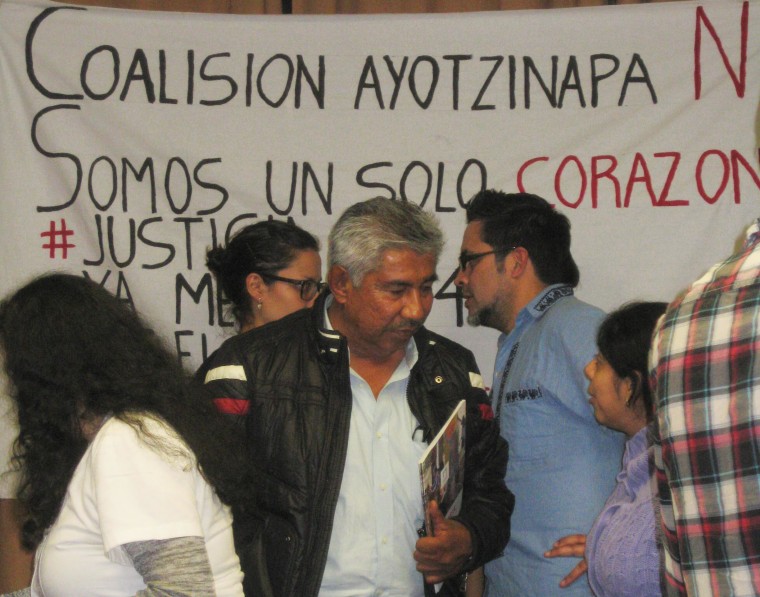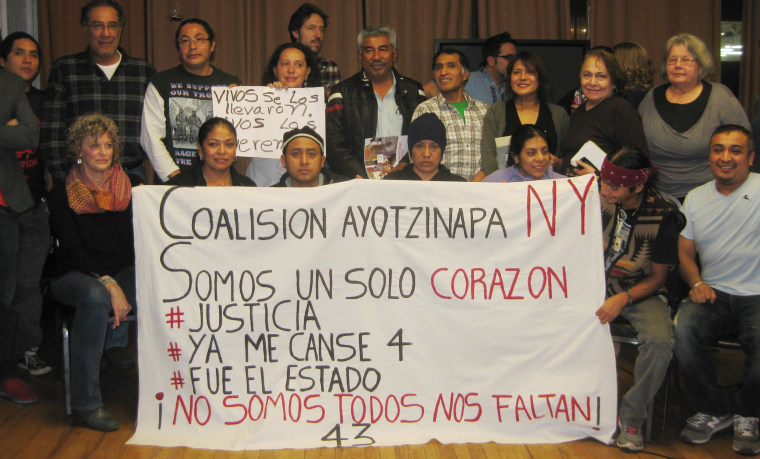NEW YORK, NY -- Three months after the disappearance of 43 indigenous students in Iguala, Mexico, activists plan to mobilize on January 5 and 6 to protest Mexican President Enrique Peña Nieto’s visit to the United States.
Activists on both sides of the U.S.-Mexico border say that the Mexican government wants to close the case to end the social protests about the missing students and other disappearances that have resurfaced in the public eye after the excavation of mass graves in Iguala.
Many Mexicans see the case of the missing students as a window that encapsulates many of the underlying issues in Mexico.
“We now see that all the problems in our country [Mexico] have converged in Iguala,” said Mexican anthropologist and human rights activist Abel Barrera at a recent meeting with community organizers in New York City. “What lives in Iguala is what we live in most of the regions of our country.”
And for Mexican expats and Latino activists in the U.S. - many who have mobilized under #USTired2, Iguala is also a window into social issues in America. Disenfranchisement with the economy, housing policy, immigration and recent civil rights protests in Ferguson and New York are compelling activists to make connections between the U.S. and Mexico.

“What happened in Iguala is happening to all of us everywhere—austere politics, the militarization of governments, lack of finance for public education, the violation of immigrant and labor rights—and that is why we need to connect our issues with other movements [like Michael Brown in Ferguson and Eric Garner in New York] to give them more visibility, make them stronger,” said CUNY History professor Gerardo Rénique at the meeting with Barrera in December.
U.S. activists see themselves as part of a larger human rights movement that is mobilizing in different countries to address similar issues.
“We need to consciously connect the dots between Mexico and the U.S.,” said writer and journalist Roberto Lovato, a visiting scholar at U.C. Berkeley's Center for Latino Policy Research and lead organizer for USTired2. “We cannot allow movements to be limited by borders - drug violence, poverty, immigration [and climate change] are the consequences of farther reaching policies," said Lovato in a phone interview with NBC News.
The idea of different groups coming together to address human rights, economic injustice and other global issues is not new. Coalitions like the People’s Climate March organized thousands of protestors from different backgrounds to rally against climate change in New York last September. Other popular movements like Occupy Wall Street also made similar connections, building transnational networks to push forward new social agendas. And U.S. protestors are relying on their experiences with immigration reform and other movements to connect Iguala with the U.S.
“We are trying to awaken the vital connections that immigrants leave behind, help them reconnect with their origin to channel those [same] issues in the United States,” said Juan Carlos Ruiz, a New York-based community organizer, in a phone interview.
In Mexico, the parents of the 43 missing students have emerged as the “moral authorities” for many in the country. As the families continue on their quest for justice, many others have been inspired to call for social change.
“Ayotzinapa is something that hurts us all,” said an activist during the meeting with Abel Barrera in New York, “but at the same time it has planted a seed of life in all of us and harvested hope for change.” Activists hope that these connections will help them find community-based solutions for organized crime, the war on drugs and other issues on both sides of the U.S.-Mexico border.
And when the President of Mexico visits the U.S. in January 6 to discuss economic and political agreements between both governments, the coalition of activists say they are mobilizing nationwide to remind both Presidents that they need to work more closely with communities.
“A national protest emphasizes that Iguala is not an isolated incident,” said Ruiz. “It is the consequence of much bigger issues that affect us at home and in Mexico.”
